What’s the Science behind Climate Change? MIT Faculty Discuss their Research (Podcast)
-
-
slice.mit.edu
- 16
Filed Under
Recommended
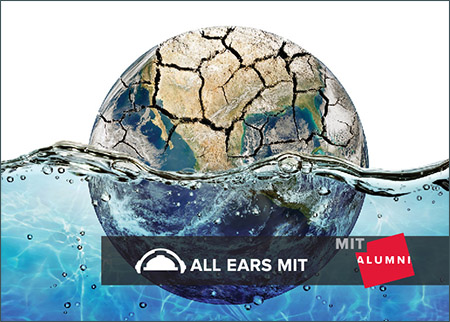 What’s the science behind a warming climate, and can it be combated? In this Slice of MIT Podcast, MIT faculty members discuss the history and science behind Earth’s warming climate, and if anything can be done to mitigate a rising global temperature.
What’s the science behind a warming climate, and can it be combated? In this Slice of MIT Podcast, MIT faculty members discuss the history and science behind Earth’s warming climate, and if anything can be done to mitigate a rising global temperature.Some public debates on climate change tend be centered on complex numerical models—great for predicting quantitative estimates, not so great for collaborative discussions and brainstorming solutions. During this podcast, listen to four MIT faculty members—supported by historical and scientific data—discuss divergent areas of climate-related research, including coastal flooding, global warming, hurricane activity, and economic policy.
Subscribe to the Slice of MIT Podcast on iTunes and SoundCloud. Listen to past podcasts with novelists, professors, and entrepreneurs by visiting the Alumni Association's SoundCloud page.
(Read the episode transcript.)
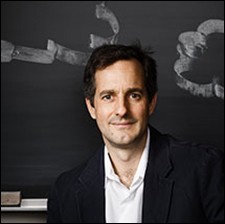
Associate Professor Dan Cziczo Dept. of Earth, Atmospheric and Planetary Sciences Cziczo is an atmospheric scientist studying how whose research is analyzing the effects that clouds may have in a increasingly warming climate. His research focuses the effect of atmospheric aerosols on cloud formations, meteoritic debris, and vehicle emissions in the atmosphere.
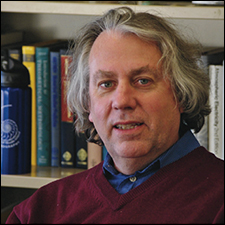
Professor Kerry Emanuel ’76, PhD ’78 Dept. of Earth, Atmospheric and Planetary Sciences Emanuel is a co-founder of the Lorenz Center, MIT's climate activity think tank. He is the author of What We Know about Climate Change and his research on hurricane activity earned him a place on Time's list of the world's 100 most influential people in 2006.
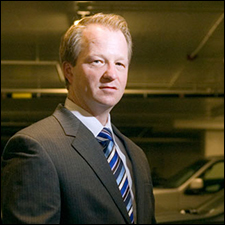
Professor Christopher Knittel MIT Sloan School of Management Knittel co-directs MIT's Center for Energy and Environmental Policy Research. The first energy chair at MIT, he has studied consumer and company reactions to energy price fluctuations—including rising prices of gasoline—and its implications on effective environmental policies.
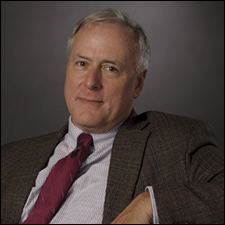
Professor Andrew Whittle ScD '87 Department of Civil and Environmental Engineering Professor Andrew J. Whittle is a geotechnical engineer who served on the panel reviewing the hurricane protection systems in New Orleans following Hurricane Katrina and Massachusetts Governor Deval Patrick’s safety review of Boston’s Big Dig tunnel system.
These interviews were culled from the Alumni Association’s Faculty Forum Online series—monthly live webcasts that feature faculty interviews on timely and relevant topics. View the entire archive on the Alumni Association website.
For more information on climate change research, visit the Climate Change Conversation at MIT website, which is exploring the actions that MIT could take to make a significant positive contribution to confront climate change. MIT alumni can join the Energy, Environment and Sustainability Network, a group of worldwide alumni volunteers who want to share their energy interests with others.








Comments
Tom
Tue, 05/05/2015 9:56am
According to NASA and NOAA, 2014 was the hottest year on record. And global CO2 emissions continue to rise according to the U.S. Energy Information Admin.
As long as we have cheap fossil fuels, the most dire effects of climate change is inevitable. So, as part of the solution, we need a carbon tax that can fund the immediate development of Gen IV nuclear reactors.
Gerald Kaiz
Sat, 05/02/2015 12:49pm
Climate change is political, religious, economic, emotional but clearly not scientific. /the models don't work so the data is fudged or created out of whole cloth to serve the conclusions of the utopians. The big melting in the Antarctic is due to a recently discovered but little reported volcanic eruption under the ice shelf. Climate change happens every day, bigger climate change can be due to large volcanic eruptions, earth wobble, sun spots solar storms and other random perturbations that are not included in any climate models. The Grand Canyon and Yellowstone Park used to be under water but clearly were drained by native American, plate tectonics can be stopped with giant infusions of plastic, mass extinctions are natural so we are trying to recreate he mammoth by impregnating elephants. How vain is humanity - all under the guise of political correctness and control. As an undergraduate (Course 8) and graduate degree (Course 22) holder, I am appalled of depths of pseudoscience and political expediency to which MIT has descended. (Johnathon Grueber as another example) all for the sake of government funding.
Joseph Horton MD
Mon, 04/27/2015 4:05pm
I'm not sure I understand. It seems that you're saying what I'm saying, which is at odds with what Kerry's saying. He's for "general understanding" rather than looking at the simulations and their assumptions; I'm for doing actual science.
Frank Sheeman
Sun, 04/26/2015 1:40pm
Why can't we have forums that discuss real potential solutions? I see a lot of effort to convince that climate change is real. A low point of a recent Technology Day Reunion was an economics professor making an emotional call for action ("Get angry") when I had hoped for some economic analysis leading towards meaningful actions. Nuclear power generates zero CO2 so where is the focus on next generation nuclear that fixes the cost, safety and legal issues with nuclear power? If climate change is inevitable and all current action programs have no meaningful impact, where is the economic analysis that suggests real strategies for at least dealing with impacts?
William Miller
Sat, 04/25/2015 6:34pm
A number of diverse sources, like the Aztec Calendar, ice cores, fossil analysis, etc. seem to indicate repetitive, worldwide extinctions with a fair degree of regularity. The book "Footprints of the Gods" postulates that these periods are the time it takes to build the polar icecaps to a height and weight that, when the gravity "drag" of the sun, moon and other planets subsequently "line up", massive continental shifts occur. That "ice age" then ends dramatically with massive floods, as the ice caps are dragged into warmer latitudes and rapidly melt.
If there is any possibility that this theory is valid, then global warming may be breaking that pattern and actually postponing the next extinction.
john werneken
Sun, 04/26/2015 1:38pm
yep, agree with Kerry. further, its propaganda in service of ideology and/or power, at that point...
Joseph Horton MD
Sat, 04/25/2015 3:46pm
Kerry Emmanuel...
"...takes an approach that emphasizes basic understanding over simulation...."
How touchy-feely. When derivations rather than conclusions appear, then it becomes science. When we instead fall for "basic understanding" over scientific method, it is religion and does not deserve to be called, and indeed is not, any form of science. Throwing around terms doesn't make it science, it makes it snake oil; being rigorous makes it science. Whatever this is, it's not what was advertised: "the science behind climate change," rather it's what Prof Emmanuel has to say from his pulpit.
It is an embarrassment that this appears and is associated with any part of MIT. It belongs with the National Enquirer.
Gerald Kaiz
Wed, 05/06/2015 8:38pm
NASA and NOAA both admit that they have too few data location for the collection of critical data and "interpolate" or fudge what they think the temperature in that location(88% of the earth's surface) should be to get the results they want. In addition if we ruin our economy to "save the world" and China and India start up a new coal fired plant every day to meet their energy need - the prevailing winds will blow the excess CO2 across the pacific and right into US territory - gaining nothing.
john werneken
Mon, 04/27/2015 3:56pm
Missing in inaction is where. Crusaders are bent on uprooting modern civilization, foot-draggers bent on preserving at least the working (promotion of material prosperity, political stability, personal safety and freedom) aspects of the existing system; technologists are exploring ways to do both...most of which lack appeal to both sets of crusaders, suspicious of nuclear on one side and suspicious of public action on the other.
john werneken
Sun, 04/26/2015 1:36pm
who knows. prepared to find out. rather do that really than change. two reasons. peace prosperity freedom and the disempowering of the powerful all require imho ongoing modernization, which while becoming constantly more efficient as to energy, still NEEDS abundantly available cheap energy, which means fossil fuels.
second, state driven anything sucks, no problem is worth state empowerment, DSTARTE EMPOWERMENT is the true threat to humans, and the gravest potential cause of the next mass extinction.
john werneken
Mon, 04/27/2015 4:30pm
agree with you. the 'understanding' ought to be attained through exposure to scientific findings, or trust in those who are so exposed and not partisans on the subject. Just send out 'understanding' is equivalent to just sending out propaganda. Kerry seems to feel 'understanding' is a benefit, regardless of how attained. Just sending out a model of an understanding may lead to AN understanding, but which one? No way to know if based on what passes for facts, which to various degrees (pardon the word) of certainty, the science IS.
I do not do science. But I do read it, and can follow the general principles relevant to statistics, even if I do not know how to assess statistical confidence with any claim to accuracy myself. I do know in general what approaches are shown valid...
john werneken
Mon, 05/04/2015 1:33pm
@Gerald Kaiz Agree one hundred percent. It's fortune telling county fair prevarications, completely!
Alan Friot
Mon, 05/04/2015 10:25am
You are right on Gerald!!! By the way I have found that any time they use the word wobble it usually means they don't really know what is happening. If you want more details look into the sights i mention in my earlier comment.
Alan Friot
Sat, 04/25/2015 10:04am
To learn about a new understanding for the earth's motion, nutation and precession go to http://alansthoughts.com/2.html and the paper " Why The Earth Wobbles ", but before doing that if you watch "Alan's Discovery" on you-tube it will help your ability to visualize what I am talking about. If you want copies of my poster just email me an address as to where to send them.
Ray
Sat, 04/25/2015 2:00am
Apologies for a miscalculation on my part, it's a 40%+ increase in CO2 levels from pre-industrial revolution to today, not 50%.
Ray
Sat, 04/25/2015 1:56am
Hi, I had a question after listening to this podcast that I was hoping someone could help answer.
Prof. Emanuel mentions if you remove all CO2, the temperature of the earth would fall from 60 degrees F to 42 degrees F so it stands to reason that if we double it, we'll see a big increase. Later, I heard on the podcast that CO2 in the atmosphere has increased quite a bit from 280ppm (pre-industrial revolution) to 400ppm (current), a 50%+ increase. I understand this also doesn't include the other greenhouse gases like methane (I'm told methane is even worse than CO2).
Has there been a significant increase in the earth's average temperature since the pre-industrial revolution? I understand adding CO2 to the atmosphere likely has a non-linear effect (I wouldn't expect doubling the CO2 to cause a +18 degree swing to match the -18 degree swing from removing all CO2) so I'm curious what effect we've seen with a 50%+ increase in CO2 levels over the past 250 years. Would greatly appreciate any articles you can point me to for more info. Thank you!